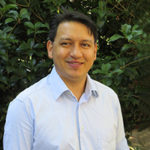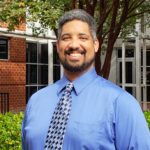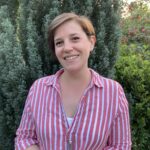Meet NCCETC’s Clean Power & Industrial Efficiency Team: The Energy Efficiency Experts for Clean Power Solutions
The NC Clean Energy Technology Center (Center) recently welcomed two new members to our Clean Power & Industrial Efficiency (CPIE) team.
The CPIE team offers technical services in all aspects of renewable energy and energy efficiency to support commercial and industrial facilities seeking to improve the efficiency of their operations through state-of-the-art technology and energy management practices. The experienced staff of engineers and specialists in project management that assist with assessing renewable energy project opportunities including solar photovoltaic (PV), biogas, biomass, wind and others. The team also specializes in uncommonly applied technologies, such as combined heat and power (CHP), district energy, energy storage, microgrids and waste heat recovery applications.
MEET THE TEAM
Isaac Panzarella, Assistant Director for Technical Services
What current projects are you working on?
 I work on a variety of projects involving direct assistance to manufacturing and commercial facilities, as well as with utility scale renewable energy development. One of these projects is the new Fitts Woolard Hall on NC State University’s Centennial Campus, on which I’ve been working with NC State Facilities and the Civil Engineering department on procurement of a rooftop solar PV array and battery storage for the building.
I work on a variety of projects involving direct assistance to manufacturing and commercial facilities, as well as with utility scale renewable energy development. One of these projects is the new Fitts Woolard Hall on NC State University’s Centennial Campus, on which I’ve been working with NC State Facilities and the Civil Engineering department on procurement of a rooftop solar PV array and battery storage for the building.
What type of expertise do you provide/focus on at the Center?
In my previous work in consulting engineering and during my time at the Center, I have been involved in many aspects of clean energy and sustainability. First of all, I assist organizations to understand how to implement sustainability goals through building programs or energy management. Secondly, I am well versed in project design, development, permitting and construction which is essential to understanding how to procure renewable energy or build sustainable projects. Thirdly, as an engineer, I have the capability to perform modeling and calculations that include daylights, renewable energy generation, building energy estimation and benchmarking, indoor air quality, and life cycle costing to name a few.
What has been the most rewarding project?
The most rewarding project I have been a part of was a large combined heat and power project that Shaw Industries in Columbia, South Carolina developed with our assistance through the Southeast CHP TAP. I oversaw a team that conducted a feasibility analysis that helped Shaw management make a decision to invest nearly $30 million in the 14 megawatt CHP project. We also provided training support to Shaw, where we hosted tours and training sessions at NC State University’s Cates Utility Plant (which has an 11 megawatt CHP system), for their plant operators through a partnership with NC State Facilities Operations and Utility Services. Projects like this support existing manufacturing facilities to improve performance, and can help spur expansion and additional jobs.
Art Samberg, CPIE Coordinator
What current projects are you working on?
 The primary project that I am working on is the US Department of Energy Southeast Combined Heat and Power Technical Assistance Partnership (CHP TAP). This is a multi-year project that I serve as the Assistant Director. In this role, I work with our team to develop and support partnerships that encourage the growth and dissemination of knowledge about the benefits of CHP to energy end-users. Through the CHP TAP program, we also provide technical assistance to industrial, commercial and institutional energy users throughout the southeastern United States.I am also co-manager on a large energy and greenhouse baseline and benchmarking analysis for a confidential client based in North Carolina. For this building we utilized the U.S. Environmental Protection Agency’s (EPA) Portfolio Manager application to develop energy consumption and greenhouse gas emission metrics for several of the company’s buildings in the state as well as for their mobile equipment.
The primary project that I am working on is the US Department of Energy Southeast Combined Heat and Power Technical Assistance Partnership (CHP TAP). This is a multi-year project that I serve as the Assistant Director. In this role, I work with our team to develop and support partnerships that encourage the growth and dissemination of knowledge about the benefits of CHP to energy end-users. Through the CHP TAP program, we also provide technical assistance to industrial, commercial and institutional energy users throughout the southeastern United States.I am also co-manager on a large energy and greenhouse baseline and benchmarking analysis for a confidential client based in North Carolina. For this building we utilized the U.S. Environmental Protection Agency’s (EPA) Portfolio Manager application to develop energy consumption and greenhouse gas emission metrics for several of the company’s buildings in the state as well as for their mobile equipment.
Another interesting project I am managing is a research project to identify potential renewable energy options for the NC Department of Transportation to deploy in areas where electronic equipment (cameras and other safety-related devices) have limited to no access to the power grid. I am also supporting a state-wide development of county-based inventory of biomass resources throughout North Carolina. The data from this project will provide a robust understanding of the geospatial energy potential of agricultural, forest and municipal solid waste resources within the state.
One upcoming project I am excited about supporting is the NC Power Reserve Project, which will help identify best practices for utilities to integrate a growing amount of solar energy penetration into the power grid.
What type of expertise do you provide/focus on at the Center?
I have an extensive background in energy project siting and permitting which is helpful as we engage with clients considering the addition of a new CHP plant or, for example, a project developer proposing a new biogas project. I also have a strong understanding of air emissions from combustion (as well as non-combustion) sources and how these emissions relate to US EPA regulations affecting multiple industrial and utility sectors. This background has also enabled me to support clients that need a detailed assessment of their lifecycle greenhouse gas calculations and an understanding of carbon intensity metrics utilized in the marketplace.
What has been your most rewarding project?
The Southeast CHP TAP project has been the most rewarding project to me for several reasons. First, it fits well with my background of energy project development and environmental compliance, while it also provides me with multiple opportunities to work with dedicated energy engineers at the various sites we have supported in the southeastern United States. The CHP TAP project has enabled me to provide technical and other support to our clients as they ponder the best solution for a cost-effective and resilient source of energy. This is very rewarding, because prior to working on this project, I would only get involved in energy projects once the developer had already made the decisions to proceed with the siting and licensing of the project. So, the CHP TAP project filled in a very important gap in my energy project resume of over 40 years of experience, by helping clients identify the best energy option before the development process starts.
Ted Spencer, Project Engineer
What current projects are you working on?

We’ve just begun work with a state agency to help them look at potential sites for solar photovoltaic installations across North Carolina, in order to meet the requirements of Executive Order 80 for greenhouse gas reductions and reduced energy consumption. These collaborations with other organizations and agencies within the state are some of my favorite type of work, because the challenges and solutions are always different.
What type of expertise do you provide/focus on at the Center?
As an engineer, I work on the technical and engineering side of projects, doing energy audits and analysis, as well as system design and feasibility analysis.
What has been your most rewarding project?
The community project for the Fayetteville Public Works Commission, offering the benefits of solar power to residents who wouldn’t otherwise have access to it, was a personal favorite of mine. Energy and environmental equity are issues I care very deeply about, so it was rewarding being involved with this kind of project.
GET TO KNOW THE NEWEST MEMBERS OF THE TEAM
Christina Kopitopoulou, Senior Project Manager

Christina Kopitopoulou is returning to the Center as a senior project manager for the CPIE team. Prior to joining the Center she was a program manager at EPIC at UNC Charlotte. She managed the EPIC Affiliates Program, a partnership between industry and academia which focuses on workforce development and aims to drive new advancements in the energy fields as it educates a new generation of engineering professionals. She also worked on several energy related projects including energy storage, electric vehicle (EV) infrastructure and energy resiliency. Christina holds a BSc in Mechanical Engineering Technology and Technical Education and a MSc in Sustainable Energy Technology.
What kind of expertise are you bringing to/focusing on at the Center?
At the Center, I will be working with the CPIE team to successfully bring projects to fruition in a timely manner. I’ll be working with the team mostly on combined heat and power, energy efficiency and policy related projects. My focus will be on end-user engagement and technical assistance. I believe that my past experience on program management and industry engagement fits well with the team’s current needs.
What experience in the clean energy industry have you previously had?
While in Greece, I worked on solar thermal collector screenings and later during my previous time at the Center, I worked on solar thermal collector testing and preparation of a test lab for accreditation. In the following years, I worked with the CPIE team on the Southeast CHP TAP program until 2016, mainly focusing on CHP qualification screenings and industry outreach. Furthermore, at EPIC I gained experience on a variety of energy related projects including energy storage, EV infrastructure and energy resiliency.
Elizabeth Bowen, Senior Project Manager

Elizabeth Bowen is a Raleigh native; she graduated from high school at Saint Mary’s School in Raleigh. She earned a Bachelor’s of Science in Geology and Environmental Geosciences and returned to Raleigh to earn her MBA from NC State University. Previously, Elizabeth worked as energy project manager for a Duke Energy contractor on providing energy efficiency design assistance for commercial and light industrial new construction in North Carolina, South Carolina and Indiana.
What kind of expertise are you bringing to/focusing on at the Center?
I have worked in energy efficiency in new and existing buildings, and solar surveys for organizations with large portfolios of building and land assets. I am always looking for win-win opportunities and strategic alignment with organizational goals. I enjoy keeping strategic initiatives organized and on track. I am glad to be working at the Center supporting the sustainability and resiliency goals of many impressive clients. I think that partnering with the Center on emerging technologies and policies is a best kept secret of many successful projects and organizations, and this will change as people continue to hear about the great work being done here.
What experience in the clean energy industry have you previously had?
With my professional background in integrating energy efficiency, renewable energy, and sustainability into development projects, I am bringing experience in design, construction, and utility industries to the Center. I also bring program development and training expertise as the co-developer of the Leadership in Energy & Environmental Design (LEED) Lab course in NC State’s Design School and developed the pilot for the B Corp Clinic in the Poole College of Management. I serve as a co-instructor for LEED Lab and coach as well as provide technical expertise for the B Corp Clinic.
Currently, I sit on the Community Climate Action Plan technical expert team for the City of Raleigh and I serve on the City’s Environmental Advisory Board. I hold a current NC State Real Estate license and certifications as Professional Energy Manager as well as LEED Accredited Professional and WELL AP.